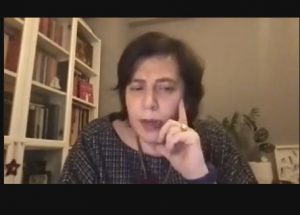Sevengül Sönmez: “Archives do not just explain the world of authors; It also sheds light on the period they lived and produced.”
 Samsun University Centre of Art and Thought hosted Sevengül Sönmez, moderated by Servet Gündoğdu and Kaan Kurt within the scope of “Öteki Buluşmalar” 2020 Fall Semester. With her speech titled “From Archive to Books” in the online program, Sönmez presented her evaluations on why literary archives are important, what these archives tell us, what can be done with the archives, how editorial critics should be prepared, and why they are necessary.
Samsun University Centre of Art and Thought hosted Sevengül Sönmez, moderated by Servet Gündoğdu and Kaan Kurt within the scope of “Öteki Buluşmalar” 2020 Fall Semester. With her speech titled “From Archive to Books” in the online program, Sönmez presented her evaluations on why literary archives are important, what these archives tell us, what can be done with the archives, how editorial critics should be prepared, and why they are necessary.
“Literature archives are archives that enable versatile reading”
Sevengül Sönmez, who started her speech by stating that trying to talk about literary archives and archival in general brought a lot of “why not!” questions, said “There is a feeling of “archive equals an absence”. Of course, the process that has historically nurtured this view can be based on many places. So I want to show what happened, not to make an absence narrative in general. To look at what has been done in general, I prepared a guiding presentation based on examples. I wanted to start with the sentence ‘We do not have an archive. We do not have a literature archive.” I have a presentation that will focus on a lot of archive examples, as I noticed that the situation is not what I thought it was. I would like to proceed with a heading called “From Archive to Book: Literature Archives”, with questions such as “what is the archive of literature, what are the examples from the world and Turkey, What are the literature archives for, what can be done in literature archives.”
The photo I shared on the screen is one of those taken during a study in the Marbach archive. I got these photos from the German literature archive. Studies in literary archives reveal how the remnants of a writer or poet constitute a background to literary material. Also, it enables the revealing of the two-sided relationship between the published works of the author or poet and the personal archive material such as the manuscripts of her/his works, personal letters, newspaper, magazine pieces, notes she/he has collected. Archives cover many things such as IDs, reports, sickness records, private correspondence, more personal notes as part of letters, even shopping lists, including many personal items. Therefore, these are not only a literature archive but also tools that enable versatile reading.”
“Archives give you clues in the direction you are trying to look”
Continuing her words by mentioning that the archives give clues according to the way they look and their direction, Sönmez said “One of the things that I completely forgot to include in the presentation and that I now realize was the archive of Yakup Kadri. Since his wife Leman Hanım’s archive is also there, the models that Leman Hanım cut out from fashion magazines of the period and the notebooks she keeps so that I can have them sewed can be an interesting material for understanding and getting to know the world of fashion between 1930 and 1970. Therefore, literature archives can contain a wide variety of materials that can be shaped according to how you look. In general, I must say that archives give you clues in the way you know to look or in the direction you are trying to look. In other words, each material allows for different reading in different ways. The development of the intellectual world of a writer, the literary works she/he is affected by, and the factors in shaping her/his understanding of literature become researchable through the documents in the archive. Archives do not only explain the world of the authors but also they shed light on the period in which they lived and produced.”
The speech titled “From Archive to Books” ended with the active participation, questions, and contributions of the audience.
